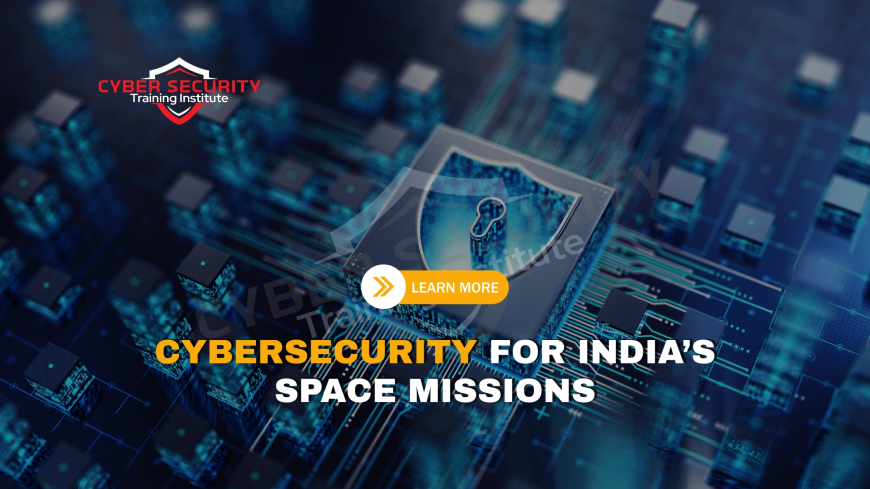Cybersecurity in Space | Protecting India’s Satellite Missions from Digital Threats
In an era where satellites power everything from weather forecasting to national security, India’s space program has become a cornerstone of its technological progress. The Indian Space Research Organisation (ISRO) has launched over 100 satellites, enabling communication, navigation, and scientific exploration. But as our reliance on these orbiting machines grows, so does the risk of cyberattacks. Imagine a hacker disrupting a satellite’s communication or, worse, taking control of it. The consequences could be catastrophic, affecting everything from military operations to everyday internet access. This blog dives into the critical topic of cybersecurity in space, focusing on how India can safeguard its satellite missions from digital threats. Whether you’re a space enthusiast or new to the topic, we’ll break it down in simple terms and explore why this matters.

Table of Contents
- Why Cybersecurity Matters for India’s Satellites
- Common Cyber Threats to Satellites
- India’s Efforts in Space Cybersecurity
- Challenges in Securing Space Assets
- Solutions and Best Practices
- The Future of Space Cybersecurity in India
- Conclusion
- Frequently Asked Questions
Why Cybersecurity Matters for India’s Satellites
Satellites are the backbone of modern technology. In India, they support critical services like telecommunications, disaster management, and military surveillance. For example, the GSAT series ensures secure communication, while the Cartosat satellites provide high-resolution images for urban planning and defense. A single cyberattack on these systems could disrupt essential services, costing millions or even endangering lives.
Cybersecurity in space is not just about protecting the satellites themselves but also the data they transmit and the ground stations that control them. A breach could lead to data theft, manipulation, or complete loss of control. For a country like India, which is rapidly expanding its space presence, ensuring robust cybersecurity is non-negotiable to maintain trust and operational reliability.
Common Cyber Threats to Satellites
Satellites operate in a harsh environment, but their digital vulnerabilities are just as dangerous as physical ones. Here are some common cyber threats:
- Jamming: Attackers send signals to overpower a satellite’s communication, disrupting its ability to send or receive data.
- Spoofing: Hackers send fake signals to trick a satellite or ground station into accepting malicious commands.
- Data Interception: Sensitive data, like military intelligence or personal communications, can be intercepted during transmission.
- Malware: Malicious software can infect ground stations or even the satellite’s onboard systems, compromising their functionality.
- Denial of Service (DoS): Overloading a satellite’s communication channels to make it unusable.
The table below summarizes these threats and their potential impacts:
| Threat Type | Description | Potential Impact |
|---|---|---|
| Jamming | Overpowering satellite signals with noise | Loss of communication, disrupted services |
| Spoofing | Sending fake signals to mislead systems | Unauthorized control, mission failure |
| Data Interception | Stealing data during transmission | Compromised national security, privacy breaches |
| Malware | Infecting systems with malicious software | System malfunctions, data corruption |
| Denial of Service | Overloading communication channels | Service disruptions, operational delays |
India’s Efforts in Space Cybersecurity
India has recognized the importance of cybersecurity in its space program. ISRO, in collaboration with the Indian government and private partners, has taken several steps to protect its satellite missions:
- Encryption: ISRO uses advanced encryption to secure data transmission between satellites and ground stations, making it harder for hackers to intercept or manipulate data.
- Secure Ground Stations: ISRO’s ground stations are equipped with firewalls, intrusion detection systems, and regular security audits to prevent unauthorized access.
- Partnerships: India collaborates with international space agencies and cybersecurity firms to stay updated on the latest threats and solutions.
- Training Programs: ISRO conducts regular training for its engineers and staff to recognize and respond to cyber threats.
- Redundancy Systems: Backup communication channels and failover systems ensure that satellites remain operational even during an attack.
India’s growing role in global space exploration, including missions like Chandrayaan and Gaganyaan, highlights the need for robust cybersecurity measures to protect its reputation and investments.
Challenges in Securing Space Assets
Protecting satellites from cyber threats is no easy task. Here are some challenges India faces:
- Complex Systems: Satellites and ground stations involve intricate hardware and software, making it hard to secure every component.
- Limited Resources:
- Global Threats: Space is a borderless domain, and cyberattacks can originate from anywhere in the world.
Legacy Systems: Older satellites may lack modern security features, making them vulnerable togenerallyUpgrading Costs: Retrofitting satellites with new security measures can be expensive and time-consuming.
These challenges require innovative solutions and significant investment, but they are critical to ensuring mission success.
Solutions and Best Practices
To address these challenges, India can adopt several best practices:
- End-to-End Encryption: Encrypt all data transmissions and commands to prevent interception and spoofing.
- AI-Based Monitoring: Use artificial intelligence to detect unusual activity in satellite communications or ground systems.
- Regular Updates: Continuously update software and firmware to patch vulnerabilities.
- Red Team Testing: Conduct simulated cyberattacks to identify and fix weaknesses in the system.
- International Collaboration: Work with global experts to adopt the latest cybersecurity technologies and standards.
Implementing these measures can significantly enhance the security of India’s satellite missions.
The Future of Space Cybersecurity in India
As India aims for ambitious goals like manned space missions and interplanetary exploration, the importance of cybersecurity will only grow. Emerging technologies like quantum encryption and blockchain-based security systems could revolutionize how satellites are protected. India’s space program is also likely to see increased collaboration with private companies specializing in cybersecurity, reducing the burden on ISRO and fostering innovation.
The government’s push for self-reliance in technology under initiatives like Atmanirbhar Bharat could lead to the development of indigenous cybersecurity solutions tailored for space applications. With a proactive approach, India can position itself as a global leader in secure space exploration.
Conclusion
Cybersecurity in space is a critical yet often overlooked aspect of India’s space program. As satellites become integral to national security, communication, and scientific advancement, protecting them from digital threats is paramount. From jamming and spoofing to data interception and malware, the risks are real and diverse. India’s proactive measures, such as encryption, secure ground stations, and international partnerships, are steps in the right direction. However, challenges like complex systems and global threats require ongoing innovation and vigilance. By adopting best practices like AI-based monitoring and regular security testing, India can safeguard its satellite missions and continue its journey as a space superpower.
Frequently Asked Questions
What is space cybersecurity?
Space cybersecurity involves protecting satellites, ground stations, and their data from digital threats like hacking, jamming, and malware.
Why is cybersecurity important for satellites?
It ensures the safety of critical services like communication, navigation, and surveillance, preventing disruptions that could affect national security and daily life.
What is satellite jamming?
Jamming is when attackers send strong signals to block a satellite’s communication, causing service disruptions.
What is spoofing in the context of satellites?
Spoofing involves sending fake signals to trick a satellite or ground station into following malicious commands.
How does data interception affect satellites?
Hackers can steal sensitive data, such as military or personal communications, during transmission, compromising security.
What is a denial-of-service attack on a satellite?
It’s an attack that overloads a satellite’s communication channels, making it unable to function properly.
How does ISRO protect its satellites?
ISRO uses encryption, secure ground stations, redundancy systems, and regular training to counter cyber threats.
What is encryption in space cybersecurity?
Encryption scrambles data so only authorized systems can read it, protecting it from interception or manipulation.
Can satellites be hacked?
Yes, satellites can be vulnerable to hacking through methods like spoofing, malware, or data interception if not properly secured.
What are ground stations?
Ground stations are facilities on Earth that communicate with satellites, sending commands and receiving data.
How does malware affect satellites?
Malware can infect satellite systems or ground stations, causing malfunctions, data corruption, or loss of control.
What is AI-based monitoring in space cybersecurity?
It uses artificial intelligence to detect unusual activity or potential cyber threats in real-time, enhancing security.
Why are legacy systems a challenge for satellite security?
Older satellites may lack modern security features, making them more vulnerable to cyberattacks.
What is quantum encryption?
It’s an advanced encryption method using quantum mechanics to create highly secure communication channels.
How does India collaborate internationally on space cybersecurity?
India works with global space agencies and cybersecurity firms to share knowledge and adopt advanced security measures.
What are redundancy systems in satellites?
They are backup systems that ensure satellites remain operational during cyberattacks or technical failures.
Can cyberattacks on satellites affect national security?
Yes, attacks on military or surveillance satellites can compromise sensitive data and disrupt defense operations.
What is a firewall in the context of ground stations?
A firewall is a security system that monitors and controls network traffic to prevent unauthorized access.
How does regular security testing help?
It identifies vulnerabilities through simulated attacks, allowing engineers to fix weaknesses before real attacks occur.
What role does training play in space cybersecurity?
Training helps engineers and staff recognize cyber threats and respond effectively to protect satellite systems.
What's Your Reaction?
 Like
0
Like
0
 Dislike
0
Dislike
0
 Love
0
Love
0
 Funny
0
Funny
0
 Angry
0
Angry
0
 Sad
0
Sad
0
 Wow
0
Wow
0















